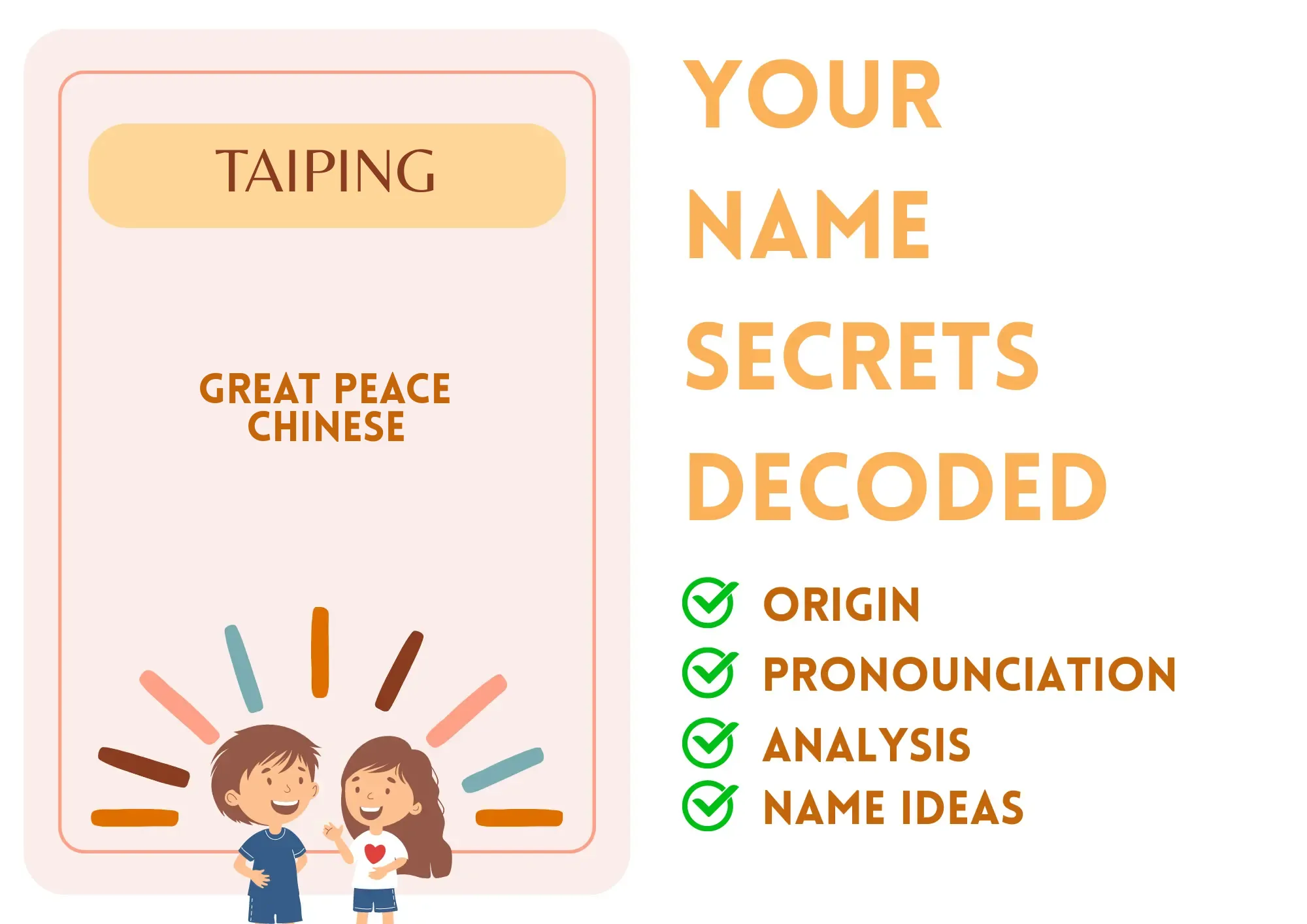
Taiping
Taiping is a unique name of Chinese origin, meaning 'great peace.' It holds significant cultural and historical value in Chinese history, notably during the Taiping Rebellion in the 19th century, which sought to establish a kingdom based on peace and prosperity. Though primarily used as a place name, it can be adopted as a given name in various contexts.
The name evokes feelings of tranquility and harmony, making it an appealing choice for parents who value peace and serenity. It is relatively easy to pronounce and write, though it may be less common in non-Chinese contexts.
In popular culture, Taiping is not frequently used to represent characters but symbolizes a peaceful state in various narratives. Overall, it is appreciated for its historical backdrop and deep, serene meaning.
Basic Information
Gender: Unisex
Sounds Like: tie-ping
Pronunciation Explanation: The first syllable 'tie' rhymes with 'fly', followed by 'ping' as in 'ping pong'.
Summary and Meaning
Meaning: great peace (Chinese)
Origin: Taiping has its roots in Chinese culture, derived from the Mandarin language.
Usage: Taiping can be considered unisex, applicable for both males and females, depending on the cultural context.
Name Number (Chaldean)
Name Number (Pythagorean)
Popularity (Global Rank)
Overall: 240019
Boys:
Girls: 77177
Most Popular in
Religious and Cultural Significance
Religion: Buddhism
Background: In Chinese culture, the concept of peace aligns well with Buddhist principles that emphasize serenity and harmony with the universe.
Cultural Significance: Taiping is historically significant due to the Taiping Rebellion, reflecting ideals of social order and peace which resonate deeply in Chinese heritage.
Historical Significance: The Taiping Rebellion (1850-1864) was a large-scale civil war in southern China, leading to significant social and political change and emphasizing the desire for a peaceful society.
Popular Culture
Literature and Mythology: While not common in fiction, the concept of peace and its significance has appeared in various texts discussing Chinese history.
Movies and Television: Taiping may appear as a location or emblematic term in films that explore historical themes or the notion of peace.
Feelings and Perceptions
Perception: Taiping is generally perceived positively, evoking feelings of tranquility and harmony.
Positive Feelings: Peaceful, serene, culturally rich, meaningful.
Negative Feelings: May sound unfamiliar or overly formal to some, limiting its appeal.
Practical Considerations
Ease of Writing and Calling: Taiping is moderately easy to write and pronounce. It has three syllables and is straightforward, though the pronunciation might be challenging for those unfamiliar with Chinese phonetics.
Common Typos and Misspellings: Taipin,Taipang,Taping,Taipingg
Common Nicknames: Tai,Ping
Taiping Popularity
Taiping Usage and Popularity By Country
| Country | Rank (Overall) |
|---|---|
| Ireland | 23749 |
| Malaysia | 23931 |
| Singapore | 53638 |
| Italy | 69345 |
| France | 98610 |
| Australia | 105589 |
| United States | 109151 |
| Canada | 149654 |
| India | 378646 |
Taiping Usage and Popularity By City
| City | Rank (Overall) |
|---|---|
| Peking | 5417 |
| Raleigh | 8910 |
| Seattle | 17340 |
Compatibility Analysis
Famous Persons Named Taiping
No results found for Taiping.
Related Names
Similar Sounding Names:
Tai,Ping,Tian,Taisun